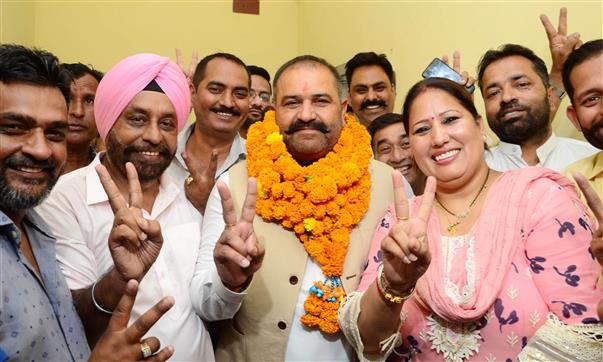Aam Aadmi Party (AAP) candidate Sushil Rinku on Saturday won the Jalandhar Lok Sabha byelection, defeating his nearest rival and Congress nominee Karamjit Kaur Chaudhary by 58,691 votes. Rinku, who had switched from the Congress to AAP in April, polled 3,02,279 (34.05 per cent) votes.
He has become AAP’s only MP in the Lok Sabha as the party lost its lone Sangrur seat in the bypoll held in June last year. Then MP Bhagwant Mann had resigned from Sangrur after taking charge as the Punjab Chief Minister.
Karamjit, the death of whose husband Santokh Chaudhary during Rahul Gandhi’s ‘Bharat Jodo Yatra’ in Jalandhar had necessitated the bypoll, trailed at 2,45,388 (27.44 per cent) votes. The sympathy factor that the Congress was expecting was nowhere to be seen as its candidate couldn’t manage lead in any of the nine Assembly seats that comprise the Jalandhar (reserved) parliamentary constituency.
The Congress lost by nearly 7,000 votes even in Phillaur, represented in the Assembly by Karamjit’s son Vikramjit Chaudhary. The sympathy wave did not work for SAD-BJP nominee Dr Sukhwinder Sukhi either as the Akali Dal was expecting major gains after the demise of its patron and former CM Parkash Singh Badal. Sukhi got 1,58,445 (17.85 per cent) votes. The BSP alone had polled 2.04 lakh votes in the 2019 Lok Sabha election.
BJP nominee Inder Iqbal Singh Atwal stood fourth with 1,34,800 (15.19 per cent) votes. The saffron party did better than its solo performance in 2022, though Atwal lost his deposit. The BJP candidate remained ahead of the SAD-BSP combine in initial rounds but as the polling shifted to rural pockets, he started trailing and the final gap was over 23,000 votes.
The BJP, however, stood out among the losers as it won in Jalandhar-Central and Jalandhar-North Assembly segments. The Congress remained a distant third in these two seats and also in Kartarpur and Nakodar even though it has five MLAs locally.
By winning the seat, AAP breached the citadel of the Congress that it had been occupying since 1999. The party’s graph soared exponentially if compared with the 2019 Lok Sabha election when Justice Zora Singh could secure only 25,000 votes. The populist scheme of free power up to 300 units per month to a large section of people probably proved crucial in AAP’s victory, said an analyst.



